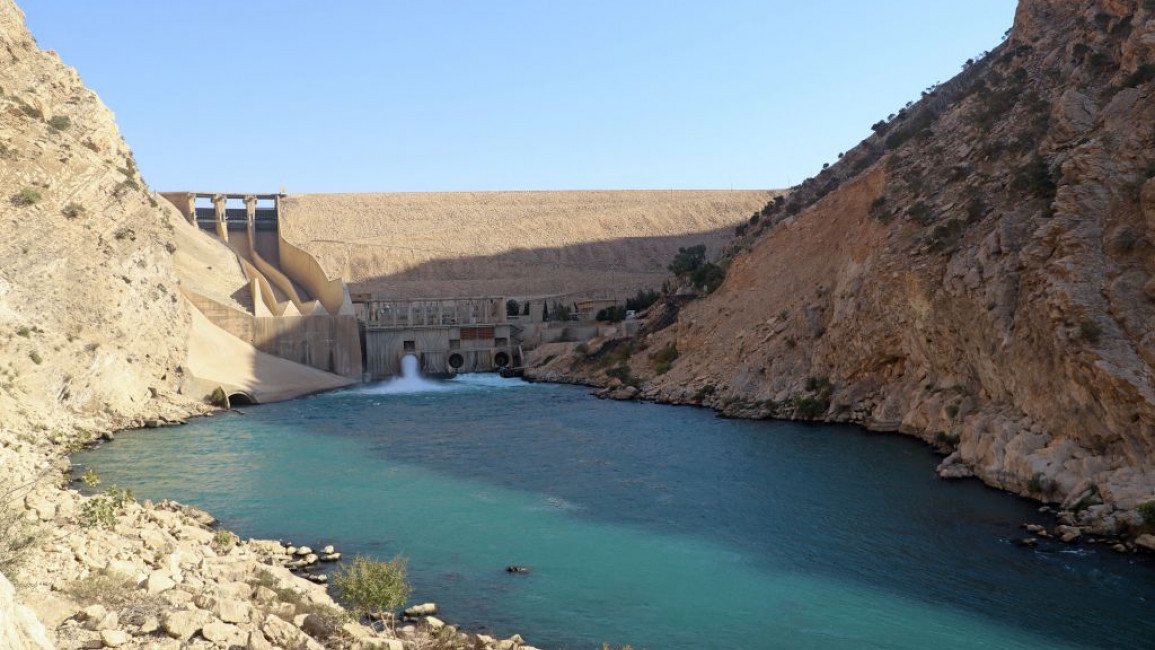Darbandikhan Lake in Iraqi Kurdistan heavily polluted by 'negligence from authorities'
Residents of Darbandikhan, a sub-district of Sulaimaniyah province in the Iraqi Kurdistan region, have been poured out into the streets since early this month to protest against the lack of clean drinking water, electricity and paved highways in the region.
Darbandikhan Lake is the main source of drinking water for the sub-district of a population of almost 850,000.
Heavily polluted, the health ministry of the Kurdistan Regional Government (KRG) declared in 2008 lake's water was unsuitable for drinking.
The Tanjero river, which runs through the city of Sulaymaniyah and pours into the lake, is considered to be one of the main reasons for the lake's contamination because the river carries large amounts of Sulaimaniyah city's sewage as well as chemical waste from many factories, oil refineries and hospitals in the area.
The KRG launched a water purification project for the town in 2013 to the tune of US$19 million. Yet, only fifty per cent of the project has been completed due to a lack of funds.
Residents of Darbandikhan district are continuing their protest for more than two weeks on Tuesday (February 14)against the lack of basic public services in the district in Sulaimani governorate. #NRTnews pic.twitter.com/aBahT2N8n6
— NRT English (@NRT_English) February 14, 2023
"We have been organising a peaceful demonstration and sit-in since early February. In the past two days, seven people have launched a hunger strike. Our main demand from the Kurdish authorities is to complete the Darbandikhan's water-purification project left unfinished since 2013," Hakim Abdul Karim, a physician and an organiser of the demonstrations, said to The New Arab.
"According to all the international standards, Darbandikhan Lake's water is unsuitable for drinking. Tests carried out by the health ministries of Iraq, as well as the KRG, showed that the water contains large amounts of hard minerals such as lead and mercury, which are the main causes of cancer and other illnesses," Karim added.
The dam which created the Darbandikhan Lake was constructed between 1956 and 1961 for irrigation, flood control, and hydroelectric power production. However, because of neglect and reduced water flows from the Sirwan river, which originates from neighbouring Iran, the production of power by the dam decreased significantly.
Abdul Karim stressed that the demonstrators will not end their sit-in and peaceful civil disobedience activities unless Kurdish authorities guarantee a resumption of work on the water purification project.
"We have been authorised by the KRG to fulfil the demands of the demonstrators. First, we will soon resume work on the water project and by next month we will increase work to deal with the electricity cut-offs. Currently, we provide 12 hours of electricity from the national grid to the local citizens," Sleman Mohammed, mayor of Darbandikhan, said to TNA during a brief phone interview.
He added that Iran reduced the water flow of the Sirwan river by fifty per cent. Consequently, authorities can only operate the hydroelectric turbines on Darbandikhan's dam for four hours a day.
"We currently produce only 10 Megawatts of electricity from the dam in 24 hours," he said.
In general, water, air, and soil pollution across Iraq are imminent threats to the country's environment. Sewage and industrial rubbish are often directly dumped into major rivers without filtration, polluting the region's two main sources of drinking water: the Dukan and Darbandikhan lakes.
"All our resources of drinking water are polluted. We have plans to establish infiltration units of sewage in the cities. But because of financial issues, the government might not be able to implement these projects for now," Abdul Razaq Khailani, spokesperson of the Kurdistan Region's Environment Board, told TNA last year.

![Trump's warm greeting to Netanyahu contrasted with Kamala Harris's critical reception [Getty]](/sites/default/files/styles/image_212x120/public/2024-07/GettyImages-2162908988.jpg?h=69f2b9d0&itok=uRh_9WXh)
![The brutal assault on Khan Younis has killed dozens and displaced thousands more [Getty]](/sites/default/files/styles/image_330x185/public/2024-07/GettyImages-2162526709.jpg?h=d3eda8cf&itok=n5N-o8p5)
![Members of the Algerian delegation threw roses into the Seine [Getty]](/sites/default/files/styles/image_212x120/public/2024-07/GettyImages-2162980872.jpg?h=199d8c1f&itok=PDhNyMBE)